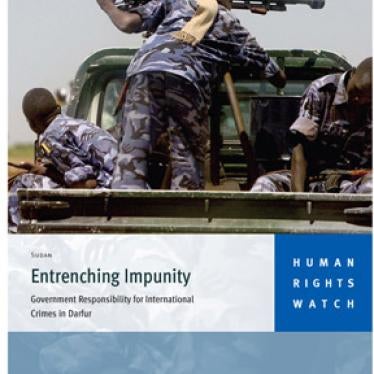(New York)- African states should reject Sudan’s bid to become the chair of the African Union on the grounds that Khartoum’s attacks on civilians, support for militias and impunity for war crimes in Darfur remain unchanged, Human Rights Watch said today. At its summit in Addis Ababa on January 29-30, the African Union will decide which country will hold the chair for 2007.
“In the past year, Khartoum has refused to make any genuine efforts to reverse its abusive policies in Darfur,” said Peter Takirambudde, Africa director at Human Rights Watch. “Awarding Sudan the chairmanship would not only reward the sponsors of crimes against humanity in Darfur, it would irreparably discredit the AU.”
African governments’ concern over Khartoum’s continuing role in abuses in the western Sudanese region of Darfur has led the African Union to defer Sudan’s chairmanship twice, first in 2005 and again in January 2006. In January 2006, AU states nominated Congo-Brazzaville as chair for one year, with Sudan nominally slated to assume the position in 2007.
No criteria exist for assuming the AU chairmanship aside from the principle of rotation among Africa’s sub-regions. Sudan’s abysmal human rights record and responsibility for massive crimes in Darfur have been implicit reasons for the AU’s deferral of a Sudanese presidency. The AU’s role in mediating peace negotiations in Darfur has also been a critical factor, with many observers citing a conflict of interest if one of the warring parties in Darfur were to hold the AU chair.
“Nothing has improved in Darfur over the past year, and in fact the situation has gotten worse,” said Takirambudde. “Sudanese officials may pledge progress, but their promises will remain meaningless until they start implementing them on the ground.”
Since the conflict in Darfur ignited in early 2003, at least 200,000 people have died and 2 million people have been displaced, mostly as a result of targeted attacks on civilians by the Sudanese government and their “Janjaweed” militia forces.
The situation in Darfur deteriorated substantially in the course of 2006, largely due to the Sudanese government’s continuing policies of arming abusive militia forces, attacking civilians, and ensuring that perpetrators of abuses enjoy complete impunity from prosecution. Political divisions among the rebel movements have also contributed to the worsening trend, particularly following the failed May 2006 peace agreement.
The Sudanese government resumed recruitment of militias and indiscriminate aerial bombardment of rebel-held areas in late 2006, leading to the deaths of civilians. Humanitarian agencies operating in Darfur have increasingly come under attack, with at least 12 aid workers killed in 2006, a trend that threatens the ability of aid agencies to provide assistance to the 3.5 million people in Darfur who rely on aid for their survival.
Sudan has continued to resist international efforts to strengthen the 7,000-member African Union Mission in Sudan (AMIS) with UN forces, an international initiative supported by many governments due to Sudan’s refusal to ensure protection of civilians in Darfur. Sudanese officials rejected the deployment of a UN mission authorized by the UN Security Council in August, and delayed agreement to a proposal for a hybrid AU-UN force that the AU and UN discussed in Addis Ababa in November.
As recently as January 10, Sudanese government officials, including President Omar El Bashir, reiterated their continuing refusal of any UN troops, according to statements in the press. Previously, some Sudanese officials had reportedly agreed to the deployment of a three-phase hybrid AU-UN force, including the third phase which includes a significant increase in troops.
“Sudan has failed on every commitment in Darfur: civilian protection, humanitarian access and accountability for grave crimes,” said Takirambudde. “If the AU considers Sudan’s policies on Darfur as key criteria for Khartoum to qualify as AU chair, then Khartoum has failed on every measure.”







